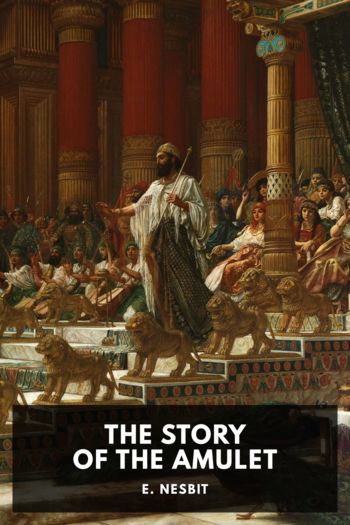The Mask of Mirrors, M. Carrick; [best books to read in your 20s .txt] 📗

- Author: M. Carrick;
Book online «The Mask of Mirrors, M. Carrick; [best books to read in your 20s .txt] 📗». Author M. Carrick;
“Giuna took her for coffee. And either an apology or a scolding—I’m not sure which. Possibly both.” His lips twitched in a battle between smile and frown. “I wish I could figure out if Sibiliat’s just toying with her.”
“What would you do if she was?” Sibiliat might have cast herself as Renata’s rival, but she was the Acrenix heir. If her affection was real, and went as far as marriage, it would go a long way to recovering the Traementis fortunes—without the threat posed by House Indestor.
Leato’s head dipped, but she doubted he was studying the bustling skiff market below. “I wish I could do something, but it’s Giuna’s choice.” His golden hair half veiled his eyes as he glanced up at Renata. “Isn’t it?”
His look begged for permission to interfere in Giuna’s courtships—an interference Renata was half tempted to indulge in herself. But she couldn’t afford to attract more of Sibiliat’s attention, much less her ire.
Smoke from the skiff market, unctuous with the aroma of roasting fat, rose to tickle her nose. Her stomach answered with an audible gurgle, and she clasped hands over it in embarrassment. “My apologies. I ate very little before our outing.” Only some porridge that was more water than rice, but she could hardly admit that to Leato. “My stomach is inconveniently delicate before fifth sun.”
Laughing off his previous mood as though it had never been, Leato took her arm and led her down the nearest river stair. “Good thing it’s almost seventh sun now. Enough of Seterin culture; let me introduce you to something uniquely Nadežran.”
He supported her hand for balance as she made the small hop from stair landing to skiff, then kept his hold as they meandered along the gently rolling lanes of the impromptu flotilla, past knotted thread charms and pots of curly-headed mums, their bright blooms almost blinding in the gloom of the day. She waited while he haggled over a pair of roasted devil crabs with a Vraszenian man so dark he must have hailed from Pražmy, in the southernmost reaches of Vraszan.
Accepting her skewer, Renata pretended to watch Leato for how to eat it, only breaking the reed in half to crack the crab’s shell after he demonstrated. They had to remove their gloves to pick out the steaming meat. Renata unaccountably felt her face warming at baring her hands to him, at seeing Leato’s bare hands in turn. His skin was soft, pale bisque, his short nails buffed to a polish. “I’ve certainly never seen anything like this,” she said, forcing her gaze away and ignoring a flutter in her stomach that had nothing to do with hunger. “But what makes it uniquely Nadežran?”
“It’s a Charterhouse thing. You need a license to operate a shop on the Old Island or the Upper Bank, and most of those licenses go to people with Liganti ancestry. But a shop is defined as ‘a commercial establishment with a fixed premise,’ so that doesn’t cover wandering sellers, or—” He waved his skewer at the weave of skiffs and boats, and the crowd of common Nadežrans picking through the river traders’ wares. “I assume you’ve seen Staveswater, out past the Turtle Lagoon?”
She’d seen it every day of her childhood, from Lacewater’s shore. The jumble of stilt-houses and houseboats was the largest Vraszenian-dominated enclave outside Seven Knots, and entirely controlled by the Stretsko gangs. Ren doubted even Vargo could get a foothold there.
“That collection of shacks? I saw it when my ship sailed in, but I assumed it was the remains of a flooded islet. You mean to say that people live there?”
Grimacing at the implied condemnation, Leato said, “It used to be bigger when I was a boy—spanned both sides of the lagoon. But Mettore throws the inhabitants in jail for any reason he can find, then gets Fulvet to tear the structures down as uninhabited. And the people there give him lots of reasons.”
She turned away, pretending interest in the traders’ wares before her true feelings escaped her grasp. The pretense became truth as she fingered cloth thick with colorful embroidery, hammered copper jewelry from the southern Toču Mountains, intricately carved flutes made of bored and fire-hardened reeds. Leato plied her with more food, most of it on sticks, but also steamed buns filled with sweet custard and a soup she had to drink quickly to keep it from leaking out of its oiled paper cup. The tang of lemongrass and pepper stayed on her lips long after the cup was tossed into the river.
The traders and skiffers were all Vraszenian, panel coats and braided hair, but most of the shoppers wandering the floating walkways had the stamp of Nadežrans born; even those clearly of mixed ancestry wore skirted coats and beaded surcoats, their hair loose or bound with ribbons. Renata and Leato stood out as the only nobility in the crowd, earning them some stares, but also the eager attention of every trader they passed. Cuffs not only meant money; they meant gullibility. Which was why Renata’s hand instinctively moved to protect her surcoat pocket when a scowling youth with crimson Stretsko beads clacking in his braids shoved past her.
But he hadn’t been going for her pocket, and Renata’s defensive shift dislodged the stack of broadsheets tucked under his arm. They scattered across the skiffway, several of them blowing into the water.
“I’m sorry,” she said, hot with shame. “I thought—” Despising herself a little for her reflexive suspicion, she stooped to help the young man gather the papers, but straightened again at the hatred in his glare.
“You’re not wanted here, chalk-face. Take your bloodstained coin and go.” Crumpling the stack of papers to his chest, he lost himself in the crowd.
Renata glanced down at the sheet clutched in her hand. It was tightly printed text, the ink so feathered on the cheap rag paper that it was difficult to read. But with the context of the boy’s words and braids,





Comments (0)